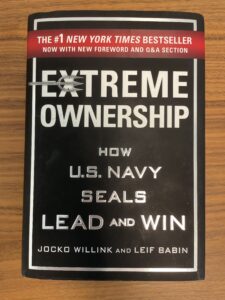5 Key Takeaways from “Extreme Ownership”
 Medical Science Liaisons don’t typically manage people, but that doesn’t mean leadership concepts don’t still apply to the day-to-day work. I always enjoy hearing MSLs explain to me what their mindset is when it comes to running their territory. There are commonalities shared among high-performing MSLs and the way they approach the management of their territory. Many prefer to act as the “CEO” of their territory.
Medical Science Liaisons don’t typically manage people, but that doesn’t mean leadership concepts don’t still apply to the day-to-day work. I always enjoy hearing MSLs explain to me what their mindset is when it comes to running their territory. There are commonalities shared among high-performing MSLs and the way they approach the management of their territory. Many prefer to act as the “CEO” of their territory.
I recently read a book called Extreme Ownership: How US Navy SEALs Lead and Win. It’s written by a pair of former Navy SEALs, Jocko Willink and Leif Babin, who now take the lessons they’ve learned from their military experience and use them to consult with businesses.
Luckily, we don’t have job functions that are as distressing as the SEALs do, but that’s what makes learning about their practices great. Out of necessity, the skills they’ve developed are as good as it gets.
Here are 5 key takeaways from Extreme Ownership to apply in a team setting.
1. Plan
Planning, when stripped down, is an assessment of our current situation, where we want to go, and how we’re going to get there. A properly executed plan is not only designed well from the top but also has a supporting cast that takes “ownership” of their roles within the team’s plan (this aptly summarizes the theme of the whole book). When discussing a plan with a team, do it in a way that welcomes questions and discussion. Keep in mind a good plan is also repeatable and is sound enough that you can keep confidence in it regardless of if a few unexpected challenges pop up.
2. Prioritize and Execute
Keeping with the “planning” theme, crucial situations call for a certain mindset to problem-solving. Top professionals in any field are prepared for myriad challenges that spawn, yet stay focused and calm while handling them. Tumultuous times require good leaders, even if you are an individual contributor “leading” your territory, to quickly be able to identify that their most important tasks are – no matter how far out of your comfort zone they are – and be able to promptly come with a plan to tactfully complete them.
3. Check Ego
Confidence is good; cockiness is not. Whether you’re directing a team of MSLs or you’re an MSL expecting your field colleagues to respect your ideas and opinions, it’s imperative to drop your ego. As the authors explain, ego can prevent us from accepting good advice, constructive criticism, and having good judgment. To pretend that we are too good to try to improve ourselves or to lack the ability to admit something is challenging only hurts us in the long run.
4. Accountability
One of the more blunt sections is titled “No Bad Teams, Only Bad Leaders. “They do a great job of explaining how a well-performing team can immediately get brought down by a bad leader and how a low-performing team can immediately improve under a good leader. Good leaders don’t look for excuses but rather take accountability and find a way to get things done. One of the best lines to take away from the book is “it’s not what you preach, it’s what you tolerate.” This can be applied to not only managing a team but also managing yourself. If you tolerate working at an average level, your standard becomes average at best.
5. Believe
In order for any “missions” in our careers to succeed, we have to believe in them. Whether you’re an individual contributor or a director, MSL team performance is a group effort, and if the group is going to succeed as a whole you have to set aside doubts that will get in the way of being successful. Part of this process is not only communicating with your colleagues *what* needs to be accomplished, but also *why* it should be accomplished. An important objective needs buy-in from people at all levels in order to succeed.
This was an interesting book that offers many humbling examples of leadership in high-pressure situations; situations far more stressful than most of us will ever have to deal with. If you’ve read it before, I would love to hear any of your own key takeaways!
Questions or comments? Email me at lawrence@sembiogroup.com.
 Author: Lawrence Beck, CPC
Author: Lawrence Beck, CPC

